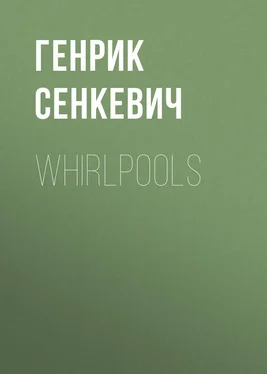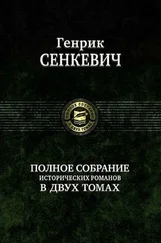Генрик Сенкевич - Whirlpools
Здесь есть возможность читать онлайн «Генрик Сенкевич - Whirlpools» — ознакомительный отрывок электронной книги совершенно бесплатно, а после прочтения отрывка купить полную версию. В некоторых случаях можно слушать аудио, скачать через торрент в формате fb2 и присутствует краткое содержание. Жанр: foreign_antique, foreign_prose, на английском языке. Описание произведения, (предисловие) а так же отзывы посетителей доступны на портале библиотеки ЛибКат.
- Название:Whirlpools
- Автор:
- Жанр:
- Год:неизвестен
- ISBN:нет данных
- Рейтинг книги:4 / 5. Голосов: 1
-
Избранное:Добавить в избранное
- Отзывы:
-
Ваша оценка:
- 80
- 1
- 2
- 3
- 4
- 5
Whirlpools: краткое содержание, описание и аннотация
Предлагаем к чтению аннотацию, описание, краткое содержание или предисловие (зависит от того, что написал сам автор книги «Whirlpools»). Если вы не нашли необходимую информацию о книге — напишите в комментариях, мы постараемся отыскать её.
Whirlpools — читать онлайн ознакомительный отрывок
Ниже представлен текст книги, разбитый по страницам. Система сохранения места последней прочитанной страницы, позволяет с удобством читать онлайн бесплатно книгу «Whirlpools», без необходимости каждый раз заново искать на чём Вы остановились. Поставьте закладку, и сможете в любой момент перейти на страницу, на которой закончили чтение.
Интервал:
Закладка:
"Either this is affected sensibility," Krzycki thought, "or else her English nerves are jangled. Why the deuce should she weep over a man whom she never saw in her life? Unless it reminded her of her father's burial or that of some near relative?"
Miss Anney did not look at all like a person with jangled nerves. Somehow, after a time, her emotion passed. She began to gaze with particular interest and attention upon the throng of people, the neighborhood, the fields, and the distant fringe of the forest as if she desired to retain them all permanently in her memory.
"She should have taken a kodak with her," thought Ladislaus.
They were already not far from the cemetery gates. But in the meanwhile a wind stronger than the former gusts broke loose. It swept suddenly across the field of sprouting grain, raised a cloud of dust on the highway, snuffed out the mendicant candles which were not extinguished before, and entwined Krzycki's neck with Miss Anney's long boa.
She relinquished his arm and, freeing him from his ties, said in Polish with an almost imperceptible foreign accent:
"I beg your pardon. The wind-"
"That is nothing," answered Ladislaus. "Perhaps you would prefer to take a carriage, for the squalls are breaking out more frequently."
"No, thank you," she replied; "I believe we are near the cemetery. I will walk alone, because I must hold my boa and dress."
During this conversation they stood opposite each other for a moment and, although that moment was brief, Ladislaus made a new discovery. Not only did he confirm his previous opinion that Miss Anney was, in reality, very beautiful and had an extraordinarily transparent complexion, set off with light hair, but above all else that her blue eyes did not radiate with two separate beams, but rather with a single, gentle, blue, slightly misty, soulful light. He was unable to explain to himself in what lay the distinct and peculiar charm of that look, but he felt it perfectly.
In the meantime, they reached the cemetery. A short prayer detained all at the gates, after which the funeral cortege moved between the poplars, swung by the winds, and crosses overgrown by luxuriant grass on the mounds, under which slept the Rzeslewo peasantry. The Zarnowski tomb stood in the centre. In its front walls could be seen an opening, knocked out for the reception of a new member of the family. At the side there were two masons, with whitened aprons, having at their feet prepared cement and a pile of new bricks. The coffin was placed upon the sand near the opening and the priests began a long chant over it. Their voices rose and then fell, like waves, in a rolling and dreamy rhythm, which was accompanied by the roar of the poplars, the flapping of the flags in the air, and the hum of prayers uttered, as if mechanically, by the peasants. Then the parish-priest of Rzeslewo began a discourse. As he did not live on good terms with the deceased, he commended his soul to the divine mercy rather than praised him. About could be seen the faces of the Zarnowski relatives, grave and appropriately grouped for the occasion, but no grief, not a tear. They were rather indifferent, with an expression of expectancy, and even tedium. The coffin appeared to be only awaiting the close of the rites, as if it was anxious to enter that vault and darkness, for which it was appropriately designed. In the meantime, after the sermon, songs began to ring. At moments they subsided, and then could be heard only the revelry of wind among the poplars. At last a high voice, as if startled, intoned "requiem aeternam" and fell suddenly like a pillar of dust twirled by the storm; and after a momentary silence "eternal repose," full of solace, resounded and the ceremony was over.
On the coffin they threw a few handfulls of sand, and then pushed it into the opening which the masons began to wall up, laying brick upon brick and coating them with mortar. The barrier, which was to forever separate Zarnowski from the world and light, grew with each moment. Groups of peasants slowly left the cemetery. Two female neighbors from Gorek, a Pani Wlocek, an old and pathetic dame, and her daughter, who was not young, approached Pani Krzycki and felt it incumbent upon them to offer a "few words of consolation," which nobody expected and which were absolutely unnecessary. Gronski began to converse with Ladislaus:
"Observe," he quietly said, looking at the work of the masons, "yet a few more bricks and then, as Dante says, 'Aeterna silenza.' No sorrow, not a tear; no one will ever come here expressly for him. Something similar awaits me, and you remember that thus they bury old bachelors. Your mother is quite right in wanting to have you married."
"To tell the truth," answered Krzycki, "the deceased was not only an old bachelor, but also was unsocial. But finally, is it not all the same?"
"After death, certainly. But during life, when you think of it, it is not at all the same. This 'lust for posthumous grief' may be illogical and foolish, but nevertheless it exists."
"Whence does it come?"
"From an equally unwise desire to outlive self. Look, the work is finished and Zarnowski is sealed up. Let us go."
At the gates the rattle of the approaching carriages was heard. The party moved towards the exit. The ladies now were in the lead; after them the priests and guests walked, with the exception of Dolhanski, who was talking to the Englishwoman.
Suddenly Ladislaus turned to Gronski and asked:
"What is Miss Anney's Christian name?"
"While we are in the cemetery you might have thought of something else. Her Christian name is Agnes."
"A beautiful name."
"In England it is quite common."
"Is she rich?"
"And that question you could defer to another time, but if you are in a hurry, ask Dolhanski. He knows those things best."
"I ask you because I see him with her and hear him chattering in English."
"Oh, that is a play within a play! He is after Pani Otocka."
"Ah!"
"Equally as old as it is fruitless. For it is yet difficult to ascertain with any exactness how much Miss Anney possesses, while the amount which the late Director Otocki left his wife is perfectly known."
"I have a hope that my beautiful cousin will give him the mitten."
"Which would increase a beautiful collection. But tell me, what do you think of your cousins?"
"Certainly-Pani Otocka-certainly-both have what the Galicians call 'something ennobling.' But Panna Marynia is still quite a child."
Gronski directed his eyes at the slim and slender figure walking before them and said:
"That is a child who could as well fly in the air as walk on earth."
"An aëroplane or what?"
"I warn you that she is the object of my highest adoration."
"So I have heard. It is already known to all men."
"Only they do not know that that adoration is not of a red color, but heavenly blue."
"I do not understand that very well."
"When you are better acquainted with her you will understand me."
Krzycki, who was more interested in Miss Anney, wanted to turn the conversation to her, but they passed the gates, before which the horses waited. The young man proceeded to assist the ladies to their seats, in which operation he saw directed towards himself for a moment the soulful eyes of the Englishwoman. Preparatory to her departure, his mother asked him whether he had finished his duties connected with the funeral and whether he would return immediately to Jastrzeb.
"No," he answered; "I have made an arrangement with the parish-priest that he should permit me to invite the priests to the rectory, and I must entertain them there. But as soon as I greet them and eat something, I will excuse myself to the guests and return as soon as possible."
Here he bowed to the ladies, after which he removed his hands from the carriage, cast a glance at the chestnut thill-horse to see if he did not overreach, and shouted:
Читать дальшеИнтервал:
Закладка:
Похожие книги на «Whirlpools»
Представляем Вашему вниманию похожие книги на «Whirlpools» списком для выбора. Мы отобрали схожую по названию и смыслу литературу в надежде предоставить читателям больше вариантов отыскать новые, интересные, ещё непрочитанные произведения.
Обсуждение, отзывы о книге «Whirlpools» и просто собственные мнения читателей. Оставьте ваши комментарии, напишите, что Вы думаете о произведении, его смысле или главных героях. Укажите что конкретно понравилось, а что нет, и почему Вы так считаете.









